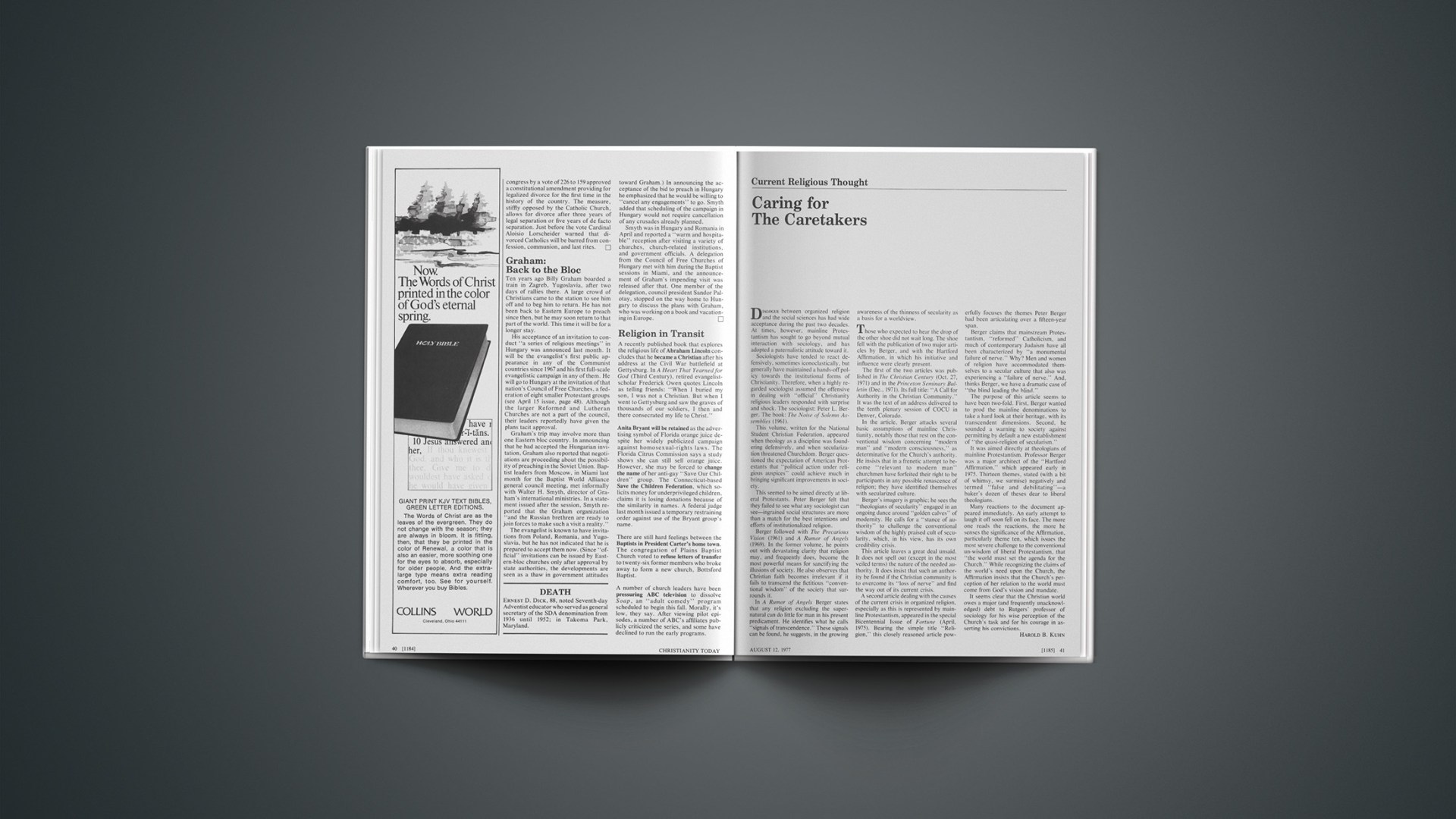Dialogue between organized religion and the social sciences has had wide acceptance during the past two decades. At times, however, mainline Protestantism has sought to go beyond mutual interaction with sociology, and has adopted a paternalistic attitude toward it.
Sociologists have tended to react defensively, sometimes iconoclastically, but generally have maintained a hands-off policy towards the institutional forms of Christianity. Therefore, when a highly regarded sociologist assumed the offensive in dealing with “official” Christianity religious leaders responded with surprise and shock. The sociologist: Peter L. Berger. The book: The Noise of Solemn Assemblies (1961).
This volume, written for the National Student Christian Federation, appeared when theology as a discipline was foundering defensively, and when secularization threatened Churchdom. Berger questioned the expectation of American Protestants that “political action under religious auspices” could achieve much in bringing significant improvements in society.
This seemed to be aimed directly at liberal Protestants. Peter Berger felt that they failed to see what any sociologist can see—ingrained social structures are more than a match for the best intentions and efforts of institutionalized religion.
Berger followed with The Precarious Vision (1961) and A Rumor of Angels (1969). In the former volume, he points out with devastating clarity that religion may, and frequently does, become the most powerful means for sanctifying the illusions of society. He also observes that Christian faith becomes irrelevant if it fails to transcend the fictitious “conventional wisdom” of the society that surrounds it.
In A Rumor of Angels Berger states that any religion excluding the supernatural can do little for man in his present predicament. He identifies what he calls “signals of transcendence.” These signals can be found, he suggests, in the growing awareness of the thinness of secularity as a basis for a worldview.
Those who expected to hear the drop of the other shoe did not wait long. The shoe fell with the publication of two major articles by Berger, and with the Hartford Affirmation, in which his initiative and influence were clearly present.
The first of the two articles was published in The Christian Century (Oct. 27, 1971) and in the Princeton Seminary Bulletin (Dec., 1971). Its full title: “A Call for Authority in the Christian Community.” It was the text of an address delivered to the tenth plenary session of COCU in Denver, Colorado.
In the article, Berger attacks several basic assumptions of mainline Christianity, notably those that rest on the conventional wisdom concerning “modern man” and “modern consciousness,” as determinative for the Church’s authority. He insists that in a frenetic attempt to become “relevant to modern man” churchmen have forfeited their right to be participants in any possible renascence of religion; they have identified themselves with secularized culture.
Berger’s imagery is graphic; he sees the “theologians of secularity” engaged in an ongoing dance around “golden calves” of modernity. He calls for a “stance of authority” to challenge the conventional wisdom of the highly praised cult of secularity, which, in his view, has its own credibility crisis.
This article leaves a great deal unsaid. It does not spell out (except in the most veiled terms) the nature of the needed authority. It does insist that such an authority be found if the Christian community is to overcome its “loss of nerve” and find the way out of its current crisis.
A second article dealing with the causes of the current crisis in organized religion, especially as this is represented by mainline Protestantism, appeared in the special Bicentennial Issue of Fortune (April, 1975). Bearing the simple title “Religion,” this closely reasoned article powerfully focuses the themes Peter Berger had been articulating over a fifteen-year span.
Berger claims that mainstream Protestantism, “reformed” Catholicism, and much of contemporary Judaism have all been characterized by “a monumental failure of nerve.” Why? Men and women of religion have accommodated themselves to a secular culture that also was experiencing a “failure of nerve.” And, thinks Berger, we have a dramatic case of “the blind leading the blind.”
The purpose of this article seems to have been two-fold. First, Berger wanted to prod the mainline denominations to take a hard look at their heritage, with its transcendent dimensions. Second, he sounded a warning to society against permitting by default a new establishment of “the quasi-religion of secularism.”
It was aimed directly at theologians of mainline Protestantism. Professor Berger was a major architect of the “Hartford Affirmation,” which appeared early in 1975. Thirteen themes, stated (with a bit of whimsy, we surmise) negatively and termed “false and debilitating”—a baker’s dozen of theses dear to liberal theologians.
Many reactions to the document appeared immediately. An early attempt to laugh it off soon fell on its face. The more one reads the reactions, the more he senses the significance of the Affirmation, particularly theme ten, which issues the most severe challenge to the conventional un-wisdom of liberal Protestantism, that “the world must set the agenda for the Church.” While recognizing the claims of the world’s need upon the Church, the Affirmation insists that the Church’s perception of her relation to the world must come from God’s vision and mandate.
It seems clear that the Christian world owes a major (and frequently unacknowledged) debt to Rutgers’ professor of sociology for his wise perception of the Church’s task and for his courage in asserting his convictions.










